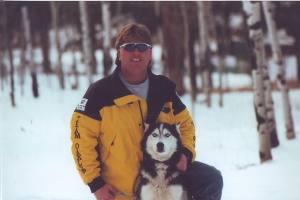The Gold Rush
 The Alaskan gold rush offered bigger stakes to many mushers. Men either went after the precious metal directly or they hauled supplies to miners, their camps and the settlements springing up across the region. Gold was first discovered in 1880 in Sitka, but was soon eclipsed by the Klondike Rush, which was on the scale of the California gold rush a half a century earlier. In California, mule and oxen transported supplies overland. In Alaska and the Yukon the method required riverboats in the summer and dog sleds in the winter. There were no roads or railroads in this land. The horses that were brought were extremely difficult to feed, and bogged down in the soft, deep snow. It was therefore left to the dog driver to tame this wild land.
The Alaskan gold rush offered bigger stakes to many mushers. Men either went after the precious metal directly or they hauled supplies to miners, their camps and the settlements springing up across the region. Gold was first discovered in 1880 in Sitka, but was soon eclipsed by the Klondike Rush, which was on the scale of the California gold rush a half a century earlier. In California, mule and oxen transported supplies overland. In Alaska and the Yukon the method required riverboats in the summer and dog sleds in the winter. There were no roads or railroads in this land. The horses that were brought were extremely difficult to feed, and bogged down in the soft, deep snow. It was therefore left to the dog driver to tame this wild land.
Hauling freight became a booming business, a man could find work easily, but finding good dogs to haul the freight was a more difficult endeavor. The mushers were called “freighters” or “dog punchers” and they carried everything one could imagine. Gold if you were lucky, you if you were not. The “dog puncher” hauled his cargo on up to three of what were referred to as “Yukon” sleds, hitching one after another with heavy chain.
“The Yukon sled measured seven feet long and 16 inches wide, was braced and shod with iron and weighed as much as 80 pounds. For a good trail, a driver would load his three sleds with 600 pounds on the front sled, 400 on the middle one, and 200 on the rear. The team: six or seven large dogs, strong and hardy.”
These first mushers, the explorers, the hunters, and the “dog punchers” were the early professionals of the arctic region. They set high standards for all of their combined endeavors. These brave pioneers proved their worth time and time again in the opening up and settling of the arctic regions. These early professionals and their dogs were now ready for their next step in the journey from Siberia to sport racing: “assimilation into the developing modern society.”
___________________
Dr. Robert Forto is the Dog Sledding Examiner, a musher training for his first Iditarod under the Team Ineka banner and the host of the Mush! You Huskies Radio Show